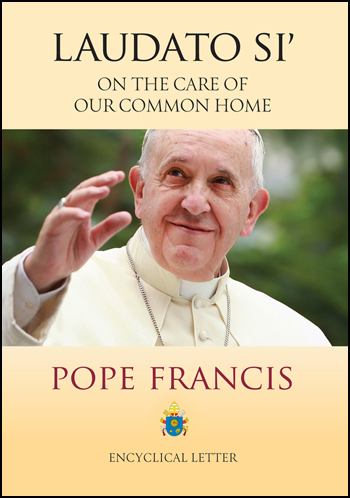 In response to Pope Francis’s powerful encyclical Laudato Si’, Catholic Voices groups across the world are calling for ideas and suggestions to absorb its lessons and put it into practice in our lives — as individuals, as members of church communities, and as citizens. Our call coincides with one being made today at the Vatican by a coalition of Catholic social justice groups.
In response to Pope Francis’s powerful encyclical Laudato Si’, Catholic Voices groups across the world are calling for ideas and suggestions to absorb its lessons and put it into practice in our lives — as individuals, as members of church communities, and as citizens. Our call coincides with one being made today at the Vatican by a coalition of Catholic social justice groups.
We’re asking you to help us to change our lives through practical suggestions and links.
Doing so could be the first generous step we can take in response to Laudato Si’.
We need ideas, suggestions, links, materials — anything that helps bring about the ecological conversion Pope Francis is calling for, in our mindset, our attitudes, and our habits. In how we lead our daily lives, in how we act, in how we pray.
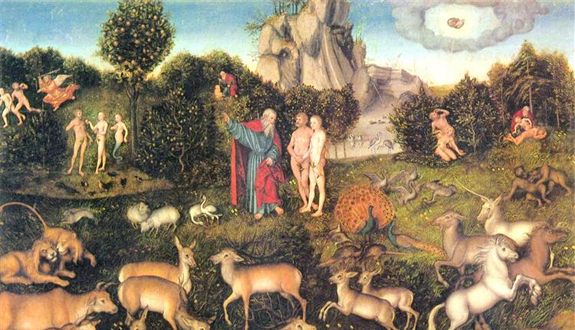 What follows is a reading of the encyclical’s final chapter, ‘Ecological Education and Spirituality’, which is designed to elicit those suggestions. If you can help answer any of these questions, or have any ideas in response, please get in touch with us (we will protect your anonymity, unless you ask us not to) by emailing us at social@catholicvoices.ca.
What follows is a reading of the encyclical’s final chapter, ‘Ecological Education and Spirituality’, which is designed to elicit those suggestions. If you can help answer any of these questions, or have any ideas in response, please get in touch with us (we will protect your anonymity, unless you ask us not to) by emailing us at social@catholicvoices.ca.
Just one or two is fine. We will collate the suggestions in further blogposts.
And we’ll spread the ideas on Twitter using the hashtag #LaudatoSi #IntegralEcology
- Towards a new lifestyle (203-208)
 (a) How can I resist the whirlwind of needless buying and spending? Are there habits or techniques you have found useful? If our greed increases when we become self-centred and self-enclosed, how can we reduce our self-centredness?
(a) How can I resist the whirlwind of needless buying and spending? Are there habits or techniques you have found useful? If our greed increases when we become self-centred and self-enclosed, how can we reduce our self-centredness?
(b) My buying affects the market: “A change in lifestyle could bring healthy pressure to bear on those who wield political, social and economic power.” What kind of deliberate buying choices can I make that will help shape a more environmentally friendly business? Can you give examples of what you’re already doing or could be doing?
- Educating for the covenant between humanity and the environment (209-215)
 (a) Pope Francis calls for an environmental education that includes the transcendent, “which gives ecological ethics its deepest meaning”. Such an education has to include the development of habits and virtues that enable people to make “a selfless ecological commitment”, expressed in “little daily actions” such as avoiding the use of plastic and paper, reducing water consumption, separating refuse, not cooking more than what we need to eat, using public transport, planting trees, turning off lights, reusing things rather than discarding them. All these, he says, “call forth a goodness which, albeit
(a) Pope Francis calls for an environmental education that includes the transcendent, “which gives ecological ethics its deepest meaning”. Such an education has to include the development of habits and virtues that enable people to make “a selfless ecological commitment”, expressed in “little daily actions” such as avoiding the use of plastic and paper, reducing water consumption, separating refuse, not cooking more than what we need to eat, using public transport, planting trees, turning off lights, reusing things rather than discarding them. All these, he says, “call forth a goodness which, albeit  unseen, inevitably tends to spread.” What daily habits, in addition to these or arising from them, can you recommend, in the spirit of Laudato Si’?
unseen, inevitably tends to spread.” What daily habits, in addition to these or arising from them, can you recommend, in the spirit of Laudato Si’?
(b) Pope Francis wants to see this “ecological education” taking place especially in families: learning to ask without demanding, saying thank you, and asking forgiveness. He calls for these “simple gestures of heartfelt courtesy” in order to create a “culture of shared life and respect for our surroundings”. Any ideas?
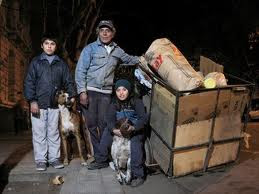 (c) So, too, in the Church — in parishes, seminaries, and the like. Pope Francis wants to see “an education in responsible simplicity of life, in grateful contemplation of God’s world, and in concern for the needs of the poor and the protection of the environment.” What can we do in our church communities to help create these “ecological virtues”?
(c) So, too, in the Church — in parishes, seminaries, and the like. Pope Francis wants to see “an education in responsible simplicity of life, in grateful contemplation of God’s world, and in concern for the needs of the poor and the protection of the environment.” What can we do in our church communities to help create these “ecological virtues”?
(d) Pope Francis calls specifically for us to learn to stop and contemplate something beautiful, as a way of combatting the “paradigm of consumerism”. What kinds of things can I daily admire without consuming?
- Ecological Conversion (216-221)
(a) Pope Francis urges an ecological spirituality that will “motivate us to a more passionate concern for the protection of the world”, and calls for a “profound interior conversion”: facing up to our failings, and desiring to do differently. This needs to be enabled, he says, not just by individuals, but in communities. What kinds of sins and failings do we need to be thinking about?
 (b) How can I and my community develop an awareness that all is gift, that “we are not disconnected from the rest of creatures but joined in a splendid universal communion”? How can we make time for contemplating creatures, and the message each has for us? How, concretely, can we learn from St Francis of Assisi – are there materials and resources you can recommend?
(b) How can I and my community develop an awareness that all is gift, that “we are not disconnected from the rest of creatures but joined in a splendid universal communion”? How can we make time for contemplating creatures, and the message each has for us? How, concretely, can we learn from St Francis of Assisi – are there materials and resources you can recommend?
- Joy and Peace (222-227)
(a) The object of such spirituality is to develop “an alternative understanding of the 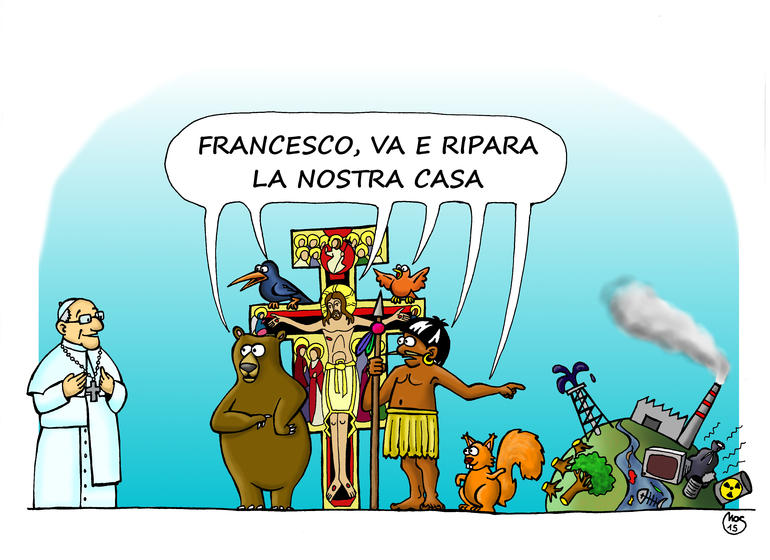 quality of life”, one that is “capable of deep enjoyment free of the obsession with consumption”. It’s about learning to be moderate, to be content with little, to stop and appreciate the small things. Such sobriety, says Pope Francis, is liberating, especially when it involves cultivating other sources of satisfaction in music and art, contact with nature, prayer, and so on. What can I do to develop that sobriety and detachment from the whirlwind of consumption? Think of times when I feel pressured — from within or without — to spend frivolously. How can I resist? Do I need to make agreements with others about Christmas and birthday presents, or what they bring to parties? Share your experiences and ideas.
quality of life”, one that is “capable of deep enjoyment free of the obsession with consumption”. It’s about learning to be moderate, to be content with little, to stop and appreciate the small things. Such sobriety, says Pope Francis, is liberating, especially when it involves cultivating other sources of satisfaction in music and art, contact with nature, prayer, and so on. What can I do to develop that sobriety and detachment from the whirlwind of consumption? Think of times when I feel pressured — from within or without — to spend frivolously. How can I resist? Do I need to make agreements with others about Christmas and birthday presents, or what they bring to parties? Share your experiences and ideas.
 (b) The Pope calls for us to make time to spend with nature. “Nature is filled with words of love, but how can we listen to them amid constant noise, interminable or nerve-wracking distractions, or the cult of appearances”, says Pope Francis. Any ideas — especially for those who live in cities, and don’t get to see much green?
(b) The Pope calls for us to make time to spend with nature. “Nature is filled with words of love, but how can we listen to them amid constant noise, interminable or nerve-wracking distractions, or the cult of appearances”, says Pope Francis. Any ideas — especially for those who live in cities, and don’t get to see much green?
(c) Pope Francis suggests that we try and “be present” to someone without thinking of what comes next. By being completely present to everyone and everything, Jesus “showed us the way to overcome that unhealthy anxiety which makes us superficial, aggressive and compulsive consumers”. He urges us to say Grace before and after meals. Any other ideas?
- Civic and Political Love (228-232)
(a) An integral ecology, says Pope Francis, “is also made up of simple daily gestures which break with the logic of violence, exploitation and selfishness”, and cites Saint Thérèse of Lisieux’s invitation to practise “the little way of love” — not missing out on a kind word, a smile, or any gesture which sows peace and friendship. Can you help with ideas or resources for developing the “little way”?
 (b) It also involves political and civic engagement: “social love moves us to devise larger strategies to halt environmental degradation”. What organizations or bodies putting pressure on governments do I need to consider supporting? What organizations best reflect the “integral ecology” Pope Francis is calling for (i.e. that avoid population control policies or support for abortion, and call for action on reducing fossil fuels etc.)? What projects or bodies do you recommend for getting informed, and/or that we should back with our time and money?
(b) It also involves political and civic engagement: “social love moves us to devise larger strategies to halt environmental degradation”. What organizations or bodies putting pressure on governments do I need to consider supporting? What organizations best reflect the “integral ecology” Pope Francis is calling for (i.e. that avoid population control policies or support for abortion, and call for action on reducing fossil fuels etc.)? What projects or bodies do you recommend for getting informed, and/or that we should back with our time and money?
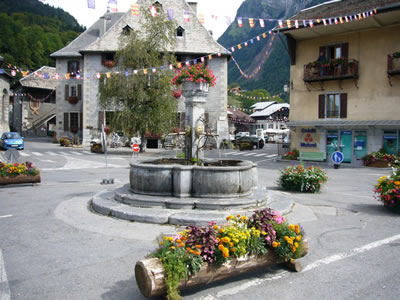 (c) Society is also enriched, says Pope Francis, by community actions that seek to protect or enhance public spaces — a fountain or square, or places that enable relationships to develop. Can you give examples from your village, town or city of such initiatives — and if you’re involved in one, tell us how it helps you.
(c) Society is also enriched, says Pope Francis, by community actions that seek to protect or enhance public spaces — a fountain or square, or places that enable relationships to develop. Can you give examples from your village, town or city of such initiatives — and if you’re involved in one, tell us how it helps you.
- Sacramental Signs and the Celebration of Rest, the Trinity, etc. (233-246)
 (a) The final section is a call to contemplation. “The universe unfolds in God, who fills it completely”, Pope Francis writes. “Hence, there is a mystical meaning to be found in a leaf, in a mountain trail, in a dewdrop, in a poor person’s face.” Do you know of poetry, literature or photography that can help us develop that consciousness?
(a) The final section is a call to contemplation. “The universe unfolds in God, who fills it completely”, Pope Francis writes. “Hence, there is a mystical meaning to be found in a leaf, in a mountain trail, in a dewdrop, in a poor person’s face.” Do you know of poetry, literature or photography that can help us develop that consciousness?
(b) Pope Francis calls for the contemplation of the Eucharist as “a source of light and motivation for our concerns for the environment, directing us to be stewards of all creation.” Sunday is a day for healing of our relationships with God, each other, and the earth. He also says it is vital to include in our work “a dimension of receptivity and gratuity, which is quite different from mere inactivity”. What does he mean, and can you give examples?
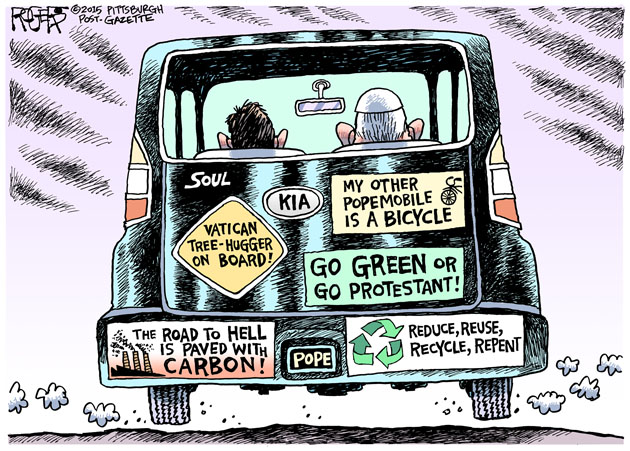 (c) The remaining sections of the chapter ask us to develop a contemplative awareness of the web of relationships in the world, notably the Trinitarian structure which St Francis of Assisi saw in every creature: “Creatures tend towards God, and in turn it is proper to every loving being to tend towards other things, so that throughout the universe we can find any number of constant and secretly interwoven relationships.” How can we develop that awareness? Are there prayers or mediations that enable us to do this?
(c) The remaining sections of the chapter ask us to develop a contemplative awareness of the web of relationships in the world, notably the Trinitarian structure which St Francis of Assisi saw in every creature: “Creatures tend towards God, and in turn it is proper to every loving being to tend towards other things, so that throughout the universe we can find any number of constant and secretly interwoven relationships.” How can we develop that awareness? Are there prayers or mediations that enable us to do this?
Thank you for any ideas or suggestions you have to help the Church respond to the invitation of Laudato Si’. Email ideas or responses to social@catholicvoices.ca
